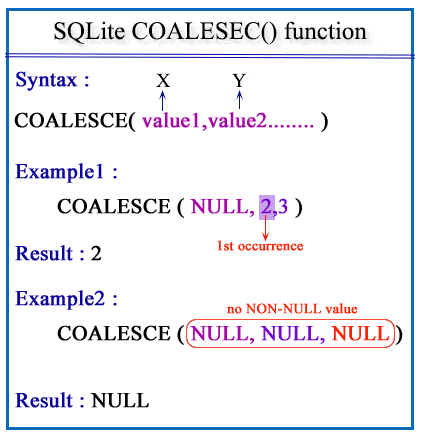SQLite coalesce() function
Description
The coalesce() function returns a copy of its first non-NULL argument, or NULL if all arguments are NULL. The function must have at least 2 arguments.
Syntax:
coalesce(X,Y,...)
Pictorial Presentation

Example: SQLite coalesce() function
sqlite> SELECT coalesce(NULL, 2, 3);
Sample Output:
coalesce(NULL, 2, 3) -------------------- 2
sqlite> SELECT coalesce(NULL, NULL, NULL);
Sample Output:
coalesce(NULL, NULL, NULL) --------------------------
The following SQLite statement returns date of establishment for the Jex Max Publication, BPP Publication, Ultra Press Inc., Night Publication and Novel Publisher Ltd. For New Harrold Publication,Mountain Publication Summer, Pieterson Grp. of Publishers, the query returns the country, since they don't have any date of establishment (NULL).
SELECT pub_id,coalesce(estd,country,pub_city)
FROM publisher;
Sample Output:
pub_id coalesce(estd,country,pub_city) ---------- ------------------------------- P001 1969-12-25 P002 1985-10-01 P003 1975-09-05 P004 1948-07-10 P005 1975-01-01 P006 1990-12-10 P007 1950-07-15 P008 2000-01-01
Sample table: publisher
Difference between ifnull() and coalesce() function in SQLite
In SQLite, ifnull() takes two expressions and if the first expression is not NULL, it returns the first expression otherwise it returns the second expression whereas coalesce() function returns the first non-NULL value of a list, or NULL if there are no non-NULL values. See the following examples:
sqlite> SELECT ifnull('Red', 'Green');
Sample Output:
ifnull('Red', 'Green')
----------------------
Red
sqlite> SELECT ifnull(NULL, 'Green');
Sample Output:
ifnull(NULL, 'Green') --------------------- Green
sqlite> SELECT coalesce(NULL, 'Green');
Sample Output:
coalesce(NULL, 'Green') ----------------------- Green
sqlite> SELECT coalesce(NULL, 'Red', 'Green');
Sample Output:
coalesce(NULL, 'Red', 'Green') ------------------------------ Red
sqlite> SELECT coalesce(NULL, NULL, NULL, 'Red');
Sample Output:
coalesce(NULL, NULL, NULL, 'Red') --------------------------------- Red
